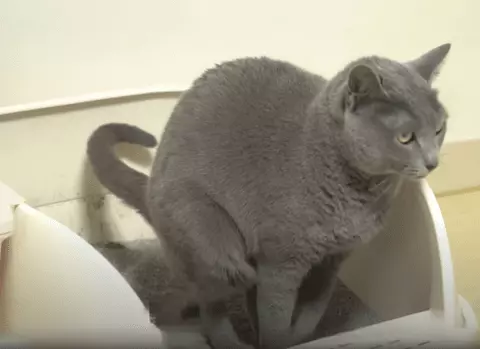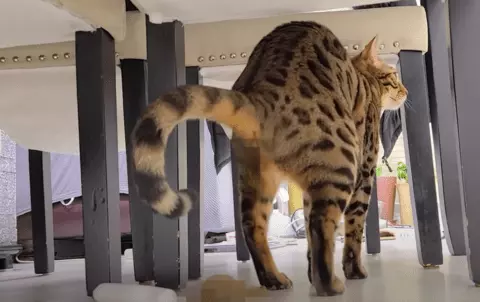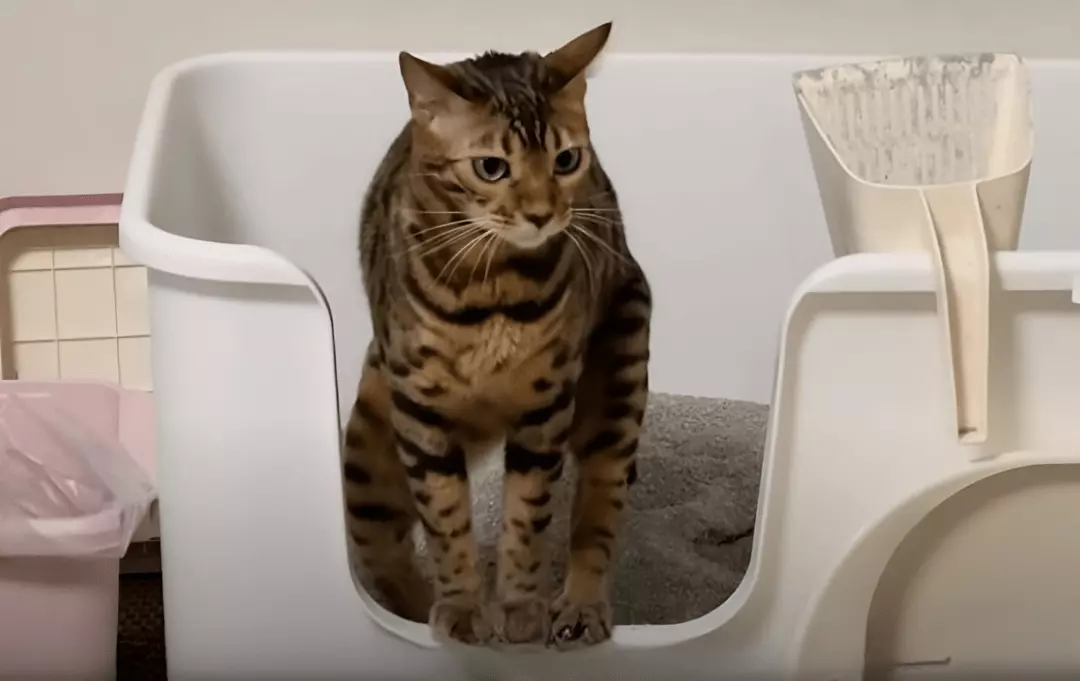If you are a cat owner, you might notice them defecate once or twice a day. That’s the typical healthy habit for cats. But, when your cat hasn’t pooped for a while, it can be a matter of concern.
So, how long can a cat go without pooping? Typically, a cat can hold their poop for 2 days and it’s seen as normal. However, if your cat hasn’t pooped for longer than 2 days and you have seen other signs, you need to take veteran help.
We have found out the health issues that might be behind your cat’s constipation. Let’s get to know more!
How Long Can A Cat Go Without Pooping?

Cats tend to poop once or twice a day. Sometimes, several conditions may interrupt their bowel habits. However, it’s normal for a cat to hold his/her poop for a maximum of 48 hours. But if your cat hasn’t pooped for longer than that, there might be other issues.
Constipation might be the reason why your cat hasn’t pooped for more than 48 hours. Mostly, stuck hairballs, dehydration, or intestinal obstruction cause your cat’s bowel abnormality.
When your cat is struggling to poop, it can bring several other health issues. So, the problem needs to be taken seriously.
Why A Cat May Not Be Pooping Regularly?

There are various reasons that stop your cat from pooping. Some of them are:
1. Dehydration
Mostly, cats stop pooping due to constipation caused by dehydration. When a cat doesn’t intake enough water, it can lead to dehydration. Thus, they face difficulty passing the stool.
2. Intestinal Blockage
Cats roam around and eat whatever they find lucrative. Sometimes, foreign objects can enter their digestive system and block their organs. As a result, they may face intestinal blockage, leading to difficulty to poop.
3. Inappropriate Diet
A cat’s diet plays a big role in regular defecating. Constantly having dry foods while not having enough water can create difficulties in passing poop.
4. Lack Of Exercise
When a cat doesn’t get enough chances to move around, it can impact its defecation. Lack of physical activity leads to constipation, as exercise helps stimulate the digestive system.
5. Medical Conditions
Certain medical conditions like megacolon, kidney disease, or intestinal blockages sometimes stop a cat from passing the stool. Thus, medications used for treating some conditions may also disrupt regular pooping.
What Is Cat Constipation?
When your cat hasn’t pooped for longer than 48 hours, it can be termed constipation. Like humans, cats also face constipation. This condition causes a cat not to defecate, or it may struggle to defecate at all.
Constipation can be caused by several factors like a lack of fiber in the diet, dehydration, hairball build-up, underlying medical condition, or side effects from medication. This causes an accumulation of dry, hard feces in the colon, making it difficult for the cat to pass them out.
A constipated cat may show other signs like decreased appetite, lethargy, vomiting, and abdominal pain. So, whenever your cat hasn’t pooped for more than 2 days, you need to address the problem immediately.
What Causes Cat Constipation?
Several factors can work behind your cat’s constipation. Some of the vital ones are:
1. Lack Of Fiber In Diet
When your cat has a lack of fiber in his/her diet, it may cause constipation. As cats are more prone to avoid fiber, it’s necessary to include fiber in their daily diet as a routine.
2. Dehydration
Cats tend to drink too little water. That’s why they often struggle with dehydration. Dehydration can lead to dry, hard stools that are difficult for cats to pass. So, when your cat hasn’t pooped for days, it can be due to dehydration.
3. Hairballs
Cats tend to groom themselves by licking their body. As a result, their hairballs get inside their stomach and cause constipation. Hairballs can cause blockages in the digestive organs of a cat.
4. Obesity
Sometimes, being overweight can act behind your cat’s constipation. When the cat has put on excessive weight, it can pressurize the colon while disrupting normal bowel movement.
5. Medications
If your cat has medical conditions, such as megacolon, intestinal obstruction, or neurological disorders, and has medications like painkillers for that, the medications may cause constipation as a side effect.
How To Treat A Constipated Cat?
When your cat hasn’t pooped for a while, you need to take immediate action. If you don’t take the necessary measures immediately, your cat may face serious consequences. So, here are a few ways how you can deal with your cat’s constipation:
- Create A Fiber-Based Diet: Cats don’t like to eat fiber willingly. So, if you create a fiber-based diet combining foods like canned pumpkin or cooked green beans. Moreover, if your cat refuses to eat such foods, you can also switch to high-fiber cat foods.
- Increase Water Intake: Dehydration acts as one of the main causes behind a cat’s constipation. You need to provide fresh water to your cat. Make sure that you have enough water bowls across multiple areas of your room. You can also make chicken stew for your cat.
- Encourage Adequate Movement: Enough movement can digest the foods soon and help your cat to defecate. You can play with your cat around the house and make him/her run after a catch. This will stimulate bowel movement more.
- Use Stool Softeners: Cats have special stool softeners for them. You can contact your vet for a stool softener and use that. Don’t use a stool softener without consulting with your cat’s vet first.
How To Avoid Cat Constipation?
If you ensure some specific areas, you can easily avoid cat constipation. The first thing relies on the diet of your cat. You need to ensure an adequate amount of fiber-based food in the diet to avoid a cat’s constipation.
Not only fiber-based foods, you should also include wet foods in your cat’s diet. Thus, this will help to make your cat’s poop soft while helping digestion. Another thing to remember is to provide enough water for your cat.
Make clean water accessible to your cat in the corners of the house so it becomes easy for your cat to reach. Keeping multiple water bowls around the house helps your cat to drink water more frequently.
Also, you need to engage your cat in regular activities. Give them enough time to play with them so they move around the house. This will help to stimulate their bowel movement while getting rid of constipation.
Lastly, keep your cat’s litter box clean all the time. The box should be filled with soft litter and easy to dig in so it’s not difficult for the cat to poop. Moreover, take care of your cat through regular grooming so s/he doesn’t swallow hairballs.
Also Read: Can You Use Regular Cat Litter After Being Neutered
Home Remedies For Constipated Cats:
When your cat is constipated, you can take some home remedies to help that. Some of the best measures that experts suggest are:
- Provide more wet food to your cat and ensure a diet filled with fibers. You can use canned pumpkin, and fiber-based cat food to improve bowel movement.
- Use a small amount of olive oil in your cat’s food so it lubricates his/her digestive system while improving bowel movement.
- If your cat has been constipated for a long period, take your vet’s suggestion and use stool softeners to help soften their stool.
- Keep a hairball gel near you to use so you can help with lubrication.
- Use a warm compress in the belly area to soften the stool and increase bowel movement.
Is Cat Constipation Deadly?
If you don’t take the necessary measures at the right time, your cat’s constipation can take an alarming turn. Initially, your cat may feel discomfort, pain, vomiting, loss of appetite, and lethargy.
However, unless you seek the right medical help at the right time, constipation can lead to other conditions like megacolon. In such cases, the cat’s colon becomes enlarged and loses its ability to contract, making it difficult or impossible for the cat to pass stool. If this goes on for a while, your cat may even face life-threatening issues.
More To Know About Your Cat’s Health (FAQs)
1. How Does A Cat Act When Constipated?
When a cat is constipated, it may cry in pain and try to defecate but fail frequently. Also, it may show signs of discomfort due to abdominal pain, lethargy, and refusal to eat.
2. Can You Massage A Cat To Help Them Poop?
Yes, massaging can help to stimulate your cat’s bowel movement. Try massaging around the belly area to stimulate your cat’s bowel movement and influence his/her poop.
3. How Do You Manually Help A Cat Poop?
You can use a warm compress to help your cat poop. Use a wet cloth using warm water and rub it around the anus of your cat. This will stimulate your cat’s bowel movement.
4. Why Is My Cat Eating But Not Pooping?
Internal blockages, improper diet, not having enough water, and stress can cause your cat to eat but not poop. If your cat is constipated for more than 2 days, it’s better to seek the vet’s help.
Wrapping Up
Now that you understand how long can a cat go without pooping, you can easily identify whether your cat is constipated or not. Cat’s constipation can take a deadly turn if you don’t take the right measures soon. So, if you notice signs of constipation, it’s better to seek a vet’s help than wait.

Hello, this is Frank Swanson, the owner, and operator of Pet Info Hut. I created this website as a way to share my love of pets with the world. I have over 7 years of experience working with animals, and I have a passion for helping people care for their pets. I hope that you find my website useful and informative. Thanks for visiting!

